Most DJI drones that don’t need a license for hobby pilots are those weighing under 250 grams—think the DJI Mini 2 SE or the Mini 3, both designed to stay light and legal! If you’re flying just for fun, these featherweights dodge FAA licensing and registration, though you’ll still need to take the TRUST test. But watch out—using them for business flips the rules! Want to know which DJI models and situations really fly under the radar? Keep going!
Key Takeaways
- DJI drones under 250 grams, such as the DJI Mini series (e.g., Mini 2, Mini 3), do not require a license for recreational use.
- Recreational pilots using sub-250-gram DJI drones are exempt from FAA registration and Remote ID requirements.
- Commercial use of any DJI drone, regardless of weight, requires a Part 107 Remote Pilot Certificate.
- All recreational pilots, even with sub-250-gram drones, must pass the FAA TRUST test.
- DJI drones over 250 grams, like the DJI Air 2S or Mavic series, require FAA registration and compliance.
Understanding FAA Drone Licensing Rules
Before you take your shiny new DJI drone for a spin, it’s important to get a grip on the FAA’s drone licensing rules—think of it as the “user manual” for legal flight! If your drone weighs over 250 grams, you’ll need to register it, whether you’re flying just for fun or for business. Age requirements are big here: you must be at least 16 to get a commercial Remote Pilot Certificate (that’s the Part 107 license). To just register, you need to be 13, but an adult can help younger pilots. Fitness standards also matter—pilots must be physically and mentally fit, plus able to read, speak, write, and understand English. No shortcuts on safety or rules, even for the coolest DJI models! Many popular DJI mini drones weigh under 249 grams, meaning they fall under the sub-250g weight classification that exempts them from FAA registration in many regions.
Recreational Drone Use and TRUST Requirements
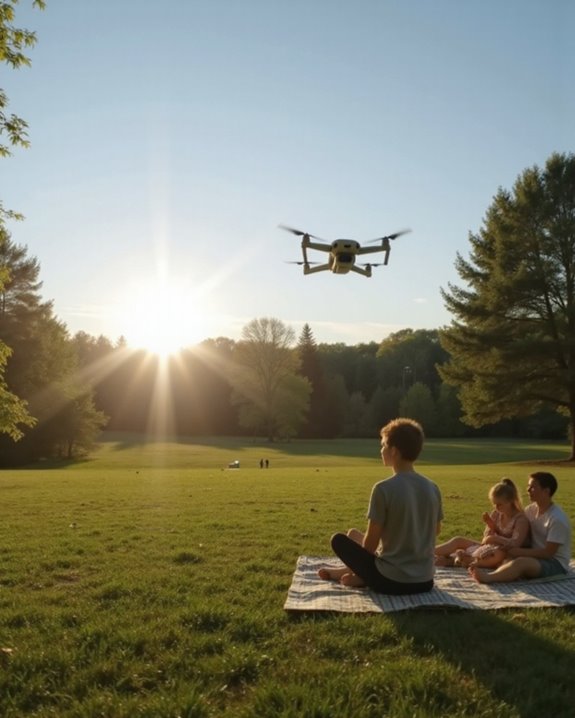
Wondering what it really takes to fly a DJI drone just for fun? For recreational pilots, it’s not as simple as just unboxing your Mini and heading outside. The FAA requires all hobbyists to pass the Recreational UAS Safety Test, or TRUST. Think of it as a quick, friendly quiz—no sweat, but it’s serious about hobby safety! The training benefits are huge: you’ll learn about airspace rules, privacy, and how not to surprise your neighbor’s cat. Once you pass, keep your proof handy, because you must show it if asked. Remember, flying in national parks is off-limits. Stick to FAA-approved guidelines and respect private property. Flying for fun is great, but knowing the rules keeps everyone safe—and makes the skies friendlier! Many popular models like the DJI Mini 3 weigh under 249g, which means they avoid FAA registration and Remote ID requirements for recreational use.
DJI Drone Weight Limits and License Exemptions
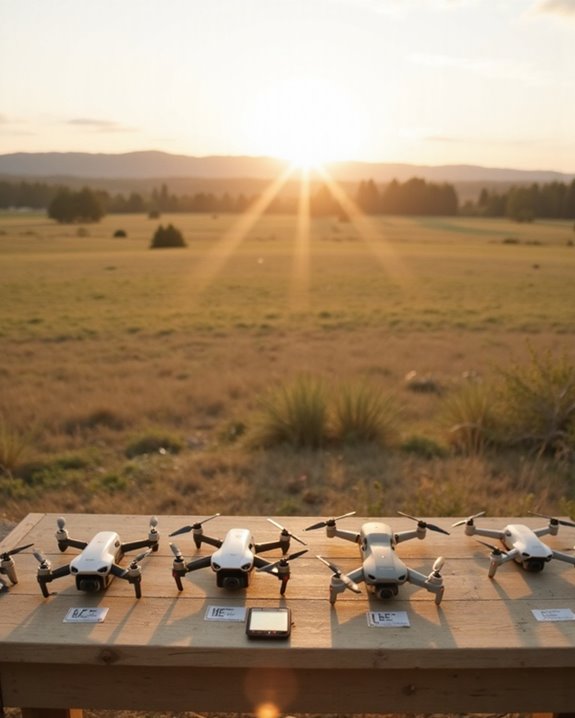
So, you’ve got your TRUST certificate and you’re ready to take your DJI drone for a spin—now it’s time to talk about weight! Global Standards set by aviation authorities say that drones under 0.55 pounds (250 grams) are in the “no license, no registration” zone for recreational pilots. That’s why DJI’s Mini series, like the DJI Mini 3, uses clever material choices to stay light but strong. If you’re flying for fun and your drone weighs less than 250 grams, you’re exempt from licensing! But if you’re thinking about launching a drone business—even with a featherweight model—you’ll need to follow Part 107 rules. Remember, drone weight isn’t just about lift; it decides what paperwork, and sometimes headaches, you’ll need! Additionally, models like the DJI Mini 4 Pro and Mini 2 SE combine lightweight design with advanced obstacle sensing features to enhance safe flying without FAA registration.
Registration Requirements for DJI Drones
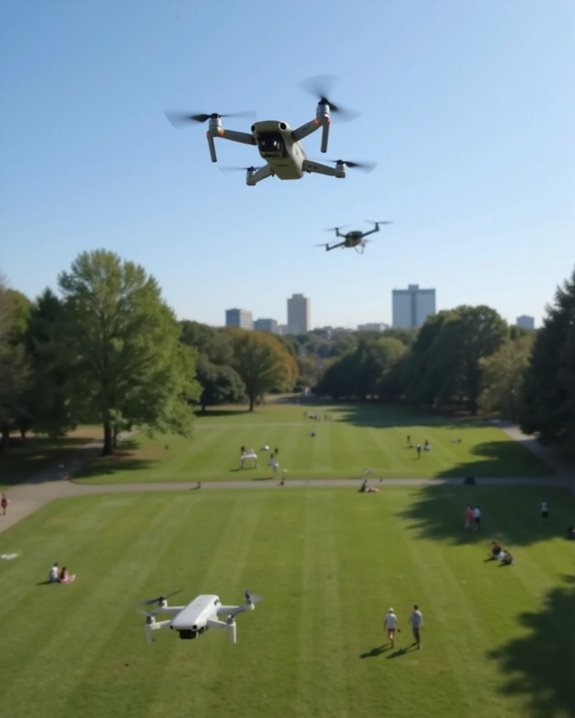
A clear set of rules governs whether your DJI drone needs to be registered, and it all starts with weight! If your drone tips the scale at more than 250 grams—think DJI Air 2S or Mavic 3—you’ll need to register it with the FAA, no matter how you plan to fly. The registration fees are only $5 per drone, and that covers you for three years, which is a pretty sweet deal! You’ll need to be at least 13 years old to register; younger pilots will need a parent or guardian to step in. The application asks for details like the drone’s manufacturer and model, so have that info handy. Even lightweight DJI Mini drones, while often exempt, should always be double-checked for requirements!
Commercial Operations and Part 107 Licensing
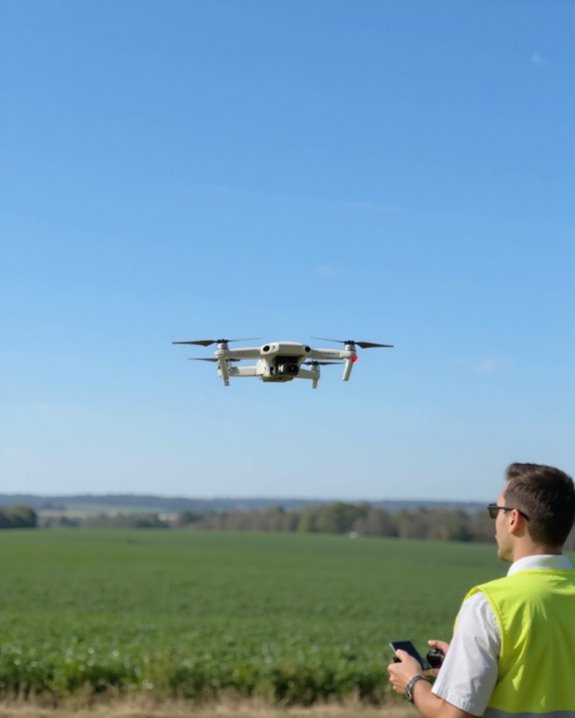
How does someone turn their love for flying DJI drones into a money-making mission? The answer: Commercial operations—like real estate photography, land surveys, or construction inspections—require following the FAA’s Part 107 rules. Anyone aiming to earn income with a DJI Mavic, Phantom, or Matrice series must complete Certification Training and pass the Part 107 exam. Some flights, like at night or over people, demand extra approval through Waiver Processes. For instance, if you want to fly your Mavic over a bustling concert, you’ll need a waiver under §107.39! But don’t get too wild—autonomous flights, carrying hazardous materials, or crop dusting are off-limits under Part 107. So, before launching your drone business, make sure you’re certified, waivered, and ready for takeoff!
Airspace and Local Regulation Considerations
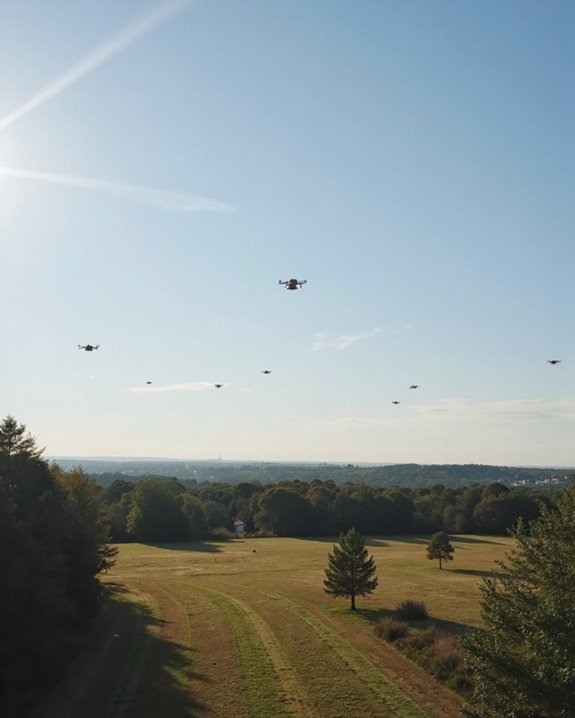
Flying the skies with a DJI drone is thrilling, but before launching your Mini 3 or Mini 4 Pro, it’s smart to brush up on airspace and local rules! Even if your drone is light enough to skip the license, you still need to follow strict rules. Always check for no-fly zones, like near airports or over national parks—rangers aren’t fans of surprise aerial visitors! Be mindful of altitude limits, sticking below 400 feet to dodge airplanes. Consider Weather Impacts: high winds or rain can turn a fun flight into a crash landing. Don’t forget Property Access; flying over someone’s backyard without permission can land you in hot water. Each community has its own quirks, so check local laws before takeoff and keep your adventures smooth!
Frequently Asked Questions
Can I Fly DJI Drones Indoors Without a License?
Indoor flying of DJI drones generally does not trigger license requirements, as FAA airspace regulations do not apply indoors. However, operators should still follow safety guidelines and institutional policies to guarantee responsible and hazard-free drone activities in enclosed spaces.
Do DJI Drones Have Built-In Software to Enforce Legal Restrictions?
Like a vigilant digital gatekeeper, DJI drones use software enforcement and geofencing updates to automatically restrict flights in no-fly zones, limit altitude, and guarantee regulatory compliance, regularly updating firmware to adapt to changing legal requirements and airspace rules.
Are There DJI Drones Specifically Designed for Beginners?
DJI offers beginner models like the Mini series and Spark, which feature user friendly features such as intuitive controls, stability systems, and safety functions. These drones are specifically designed to help new pilots learn and fly confidently.
What Happens if I Lose My TRUST Certificate?
If a user loses their TRUST certificate, there is no penalty, but they must provide proof of completion. Trust Replacement is simple; Certificate Reissue can be accomplished by retaking the test or accessing digital records from the provider.
Can I Modify My DJI Drone to Fly Higher Than 400 Feet?
Modifying a DJI drone to exceed FAA height limits of 400 feet poses significant modification risks, including legal penalties, technical challenges, and increased safety hazards. Such changes are not recommended without proper waivers and regulatory compliance from authorities.





